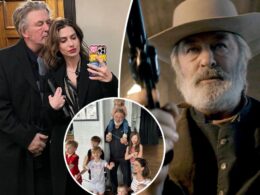A little more than three years ago, we could’ve never imagined Will Smith gettin’ jiggy wit it again.
After all, he had long ago given up his career as a lighthearted rapper and had become a serious thespian who was the frontrunner to win an Oscar in 2022 — on his third nomination — for “King Richard.”
But of course, we all know what happened next. Smith trashed an entire career that had been leading up to that moment — from sitcom star (“The Fresh Prince of Bel-Air”) to box-office boss (“Men in Black”) to acclaimed actor (“The Pursuit of Happyness”) — when he shockingly slapped Oscar presenter Chris Rock shortly before winning one of those bald bad boys.
Now he was the bad boy.
Almost three years to the day after the slap heard around the world went down on March 27, 2022, Smith is attempting the most improbable of comebacks by going back to his roots in music with “Based on a True Story,” his first album since 2005’s “Lost and Found.”
He addresses all the drama right away in the opening “Int. Barbershop — Day” with multiple voices, including DJ Jazzy Jeff, comedian B. Simone and Smith himself, gossiping about him.
“Will Smith is canceled,” opens one voice before another counters, “Oh you can’t cancel no icon.”
Playfully but pointedly, the track continues to not shy away from Oscargate: “I heard he won the Oscar but he had to give it back/ And you know they only made him do that s–t because he’s Black.” (Although, contrary to these lyrics, Smith got to keep his Oscar.)
And it even goes so far as to reference his infamous words defending Jada Pinkett Smith, warning that “You better keep his wife’s name out of your mouth.”
Then, seemingly targeting Rock, he channels the brash, hungry young man who came out of the streets of Philadelphia by trash-talking on “You Lookin’ at Me?”: “You decided to instigate it/And now you got me, I’m motivated/ITake a beat, I’m spittin’ heat, I’m on fire, incinerated/I’m way too calculated for me to ever get dominated/If I was you and I saw me, I’d see why you’d be aggravated.”
Smith continues to spit: “Took a lot, I’m back on top/ Y’all gon’ have to get acclimated/ Won’t stop, my s— still hot/ Even though I won’t get nominated/Personal life with my wife/Mind your business, it’s complicated.”
But “Based on a True Story” is more about the spiritual reflection of a man who is looking inward — and upward: Tracks such as the rumbling “Rave in the Wasteland” blur the lines between rap and gospel. There are even three sermons titled “The Reverend.”
On “You Can Make It,” he sounds more like the Fresh Preacher when he raps, “The darker the hell you gotta endure/The brighter the heaven you get to enjoy/The harder the fall, the higher you soar/God opens a window when the devil closes the door.”
And the uplifting spirit of overcoming adversity has its moments, particularly on the soulful highlight “Hard Times (Smile),” featuring Teyana Taylor.
But after 20 years, was this the comeback that anyone was waiting for? About as much as a sequel to “Wild Wild West.”
And after “Bad Boys: Ride or Die” proved that he could still deliver a hit movie last June, it feels unnecessarily desperate — and tone-deaf when “he can fit your whole house in his pool.”
Will in his feels just isn’t what the world needs or wants right now.
Even at the height of his music career — both with DJ Jazzy Jeff and the Fresh Prince hits such as “Parents Just Don’t Understand” and “Summertime” as well as solo smashes on the order of “Men in Black” and “Gettin’ Jiggy Wit It” — Smith wasn’t exactly rap royalty.
Yes, he won four Grammys — including the very first gramophone for Best Rap Performance for “Parents Just Don’t Understand” in 1989 — but that was back when voters simply went for the safe, corny choice of his pop-rap bops.
So this surprising swerve back to music at a time when Smith perhaps feels shunned by the movie world — he resigned from the Academy and can’t go back to the Oscars until 2032 — is, well, strange.
At 56, he’s the Not-So-Fresh Prince in a young man’s game that has challenged even the greatest of rappers to stay relevant in middle age.
Even 55-year-old Jay-Z — who Smith references as the bar for all rappers (“One classic album, what that make him? Jay-Z?/ Jay-Z plus movies and TV”) — hasn’t released a solo album since 2017.
But Smith turned to Jay — as well as hip-hop’s current leading man, Kendrick Lamar — before making his return to the rap world that put him on the map.
“Before I started, you know, I made two phone calls,” Smith told SiriusXM’s Shade 45 on Thursday. “I talked to Jay and I talked to Kendrick, and I was like, ‘Hey, I want to get back in music.’ And it was like, ‘What’s the advice?’ And Jay said like, ‘Don’t fake your story.’ He was like, ‘You gotta say what’s true for you.’”
“And he says, “You’ll be looking at the younger rappers, and you want that to be true for you, but you don’t live like that.” It was like, ‘Be true to your story. Tell your story.’ And that’s where I got the ‘Based on a True Story’ from Jay.’ ”
Lamar put it more bluntly: “Man, just say that s—t you always been f—king scared to say.”
Now Smith is replacing the novelty of his past hits with the reality of a man who is seeking redemption — and searching for inner peace.
Smith’s return to the music scene began in earnest when he made a guest appearance during J Balvin’s set at Coachella last April to perform “Men in Black.”
That was followed by another performance at the BET Awards last June, when he debuted the gospel-charged “You Can Make It.”
Then — forget the Oscars — he led the Quincy Jones tribute at the Grammys earlier this month.
Smith got the freshest of co-signs from the hottest new rapper of the moment — Doechii — when she appeared with him and his “Fresh Prince of Bel-Air” co-star Tatyana Ali in a TikTok video re-creating a classic dance scene from the sitcom.
And, in an attempt to take it back to the streets that gave birth to DJ Jazzy Jeff and the Fresh Prince, he got some love from his hometown this week when an actual street in West Philadelphia was named Will Smith Way.
But Smith gave up the hood for Hollywood a long time ago. And you can’t always go home, homie.








